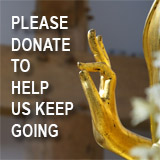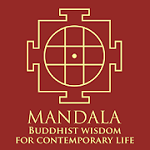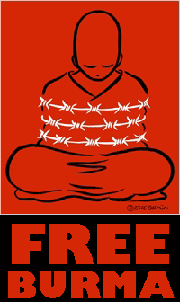
|
|
|
Home Asia Pacific South East Asia Myanmar Myanmar Protest News Burma: Monks Call for Unity and Strengthby Htet Aung, The Irrawaddy, January 16, 2008Bangkok, Thailand -- “The year 2008 must be the year for change in Burma,” said U Uttara, secretary abbot of the International Burmese Monks Organization, at a meeting with civil society groups at the Student Christian Centre in Bangkok in Thailand on January 15.
The two abbots’ trip to Thailand is part of an international campaign to mobilize governments and civil society to bring about change in Burma. Addressing the forum, “How to establish peace and security in Burma” U Pannya Vamsa said, “The most important thing is unity. Everybody - monks and laypeople alike, whether inside or outside Burma - is not really united. If we have unity, we will have strength.” U Uttara urged the Burmese community in Thailand to be united. “If we can't show our strength, other people can't help us,” he said. “To get assistance and interest from the international community, our people must take action. Only if we use our strength, will our country see change.” The two abbots stressed the importance of international pressure on the military regime. “We have plans to address parliaments, governments and Buddhist monks’ organizations around the world,” said U Uttara, adding that there was no plan to meet Thai government officials on this occasion because of their military status.
"They don't know what they should tell the government, because they can't truly observe and analyze the current situation in the country. They are selfish and powerless," he said. Regarding “patam nikkujjana kamma,” the monks’ refusal to accept alms from the military regime and its supporters, which was extended to include Burmese embassies abroad, U Uttara said, “On Independence Day [January 4], Burmese embassy staff in London tried to arrange an alms donation, but we refused to accept it. ‘Patam nikkujjana kamma’ is continuing against the regime.” The meeting with civil society groups in Bangkok was held the day after the two abbots had toured Mae Sot to observe the conditions for monks who had fled to Thailand after the Burmese military regime's crackdown on the protests in September. U Pannya Vamsa said, “There are many Burmese temples along the [Thai-Burmese] border, but no one dares go, because they are afraid of the Thai authorities and the Burmese government.” The two abbots called on the people of Thailand to view the Burma issue not as another country’s problem, but as a matter for human society. “If a country has peace, all the neighbors will have peace,” said U Uttara. “This is not just Burma's problem; you must look at it as a human problem.” The IBMO was formed in the United States on October 27, 2007, after appeals by monks and laypeople to protect Buddhism in Burma following the regime's brutal crackdown on the September “Saffron Revolution.” The organization is now planning to form branches in other countries to speed up their activities. “We have branches in India and Bangladesh,” said U Uttara. “Eventually, I believe the military regime will hold dialogue if we can organize international pressure from outside the country and simultaneously work in harmony with our people inside. That's why we need to show our unity and strength.” |
 Get your Korean Buddhist News here, brought to you by BTN-Buddhist Channel |
 |
 The Mandala app brings together Buddhist wisdom and meditation techniques with the latest insights of psychology and neuroscience to handle the challenges and complexities of modern life. The App offers a series of engaging talks and conversations with experts on a wide variety of topics, such as managing stress, dealing with adversity, developing greater resilience, cultivating empathy and compassion, creating healthy relationships, and many more. These topics are explored to help find greater peace, meaning and joy in our lives. Our panel of experts include Dr, Thupten Jinpa, Daniel Goleman, Kelly McGonigal and others.FREE DOWNLOAD here |
| Point
your feed reader to this location |
| Submit an Article |
| Write to the Editor |

 The discussion, titled “Saffron Revolution: Unfinished Business,” was chaired by two venerable Burmese monks, IBMO chairman U Pannya Vamsa, who is based in Penang, Malaysia, and secretary U Uttara, head of the Buddhist organization, Sasana Ramsi Vihara, in London.
The discussion, titled “Saffron Revolution: Unfinished Business,” was chaired by two venerable Burmese monks, IBMO chairman U Pannya Vamsa, who is based in Penang, Malaysia, and secretary U Uttara, head of the Buddhist organization, Sasana Ramsi Vihara, in London.